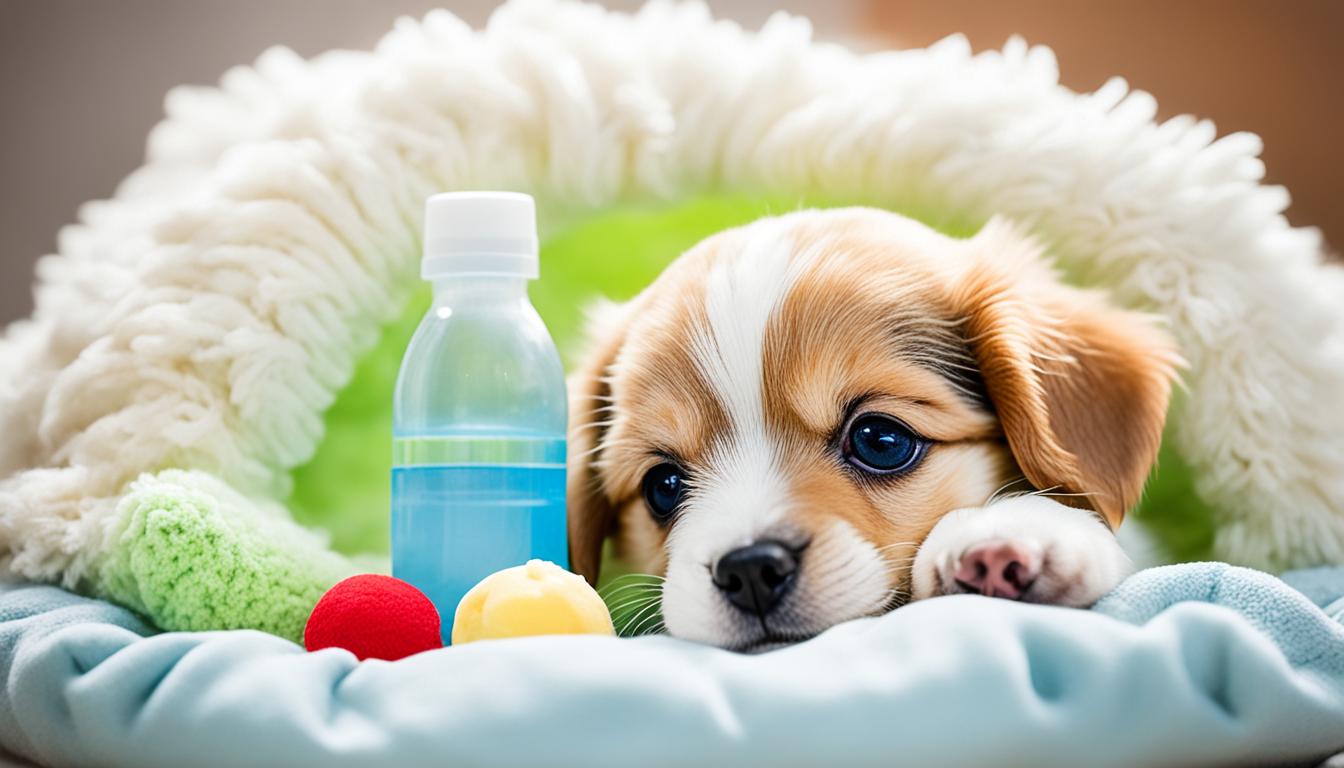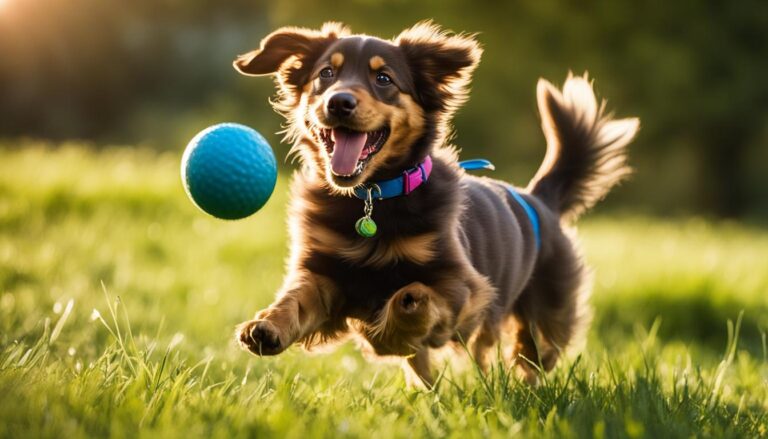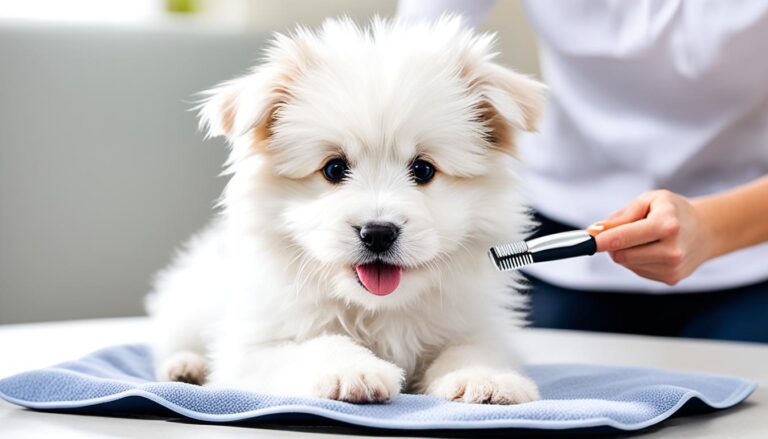Quite Small Puppy Care Tips & Advice
Bringing home a small puppy can be an exciting yet daunting experience. To ensure your small puppy gets the best start in life and to avoid any potential problems later on, follow these essential care tips and advice.
Key Takeaways:
- Prepare your home before bringing home a small puppy.
- Socialize your puppy and expose them to new experiences.
- Establish a consistent routine and rules for your puppy.
- Enroll your puppy in puppy classes for training and confidence-building.
- Consult with a veterinarian for personalized guidance.
Preparing for Your Quite Small Puppy’s Arrival
Bringing a small puppy into your home is an exciting and joyful experience. However, before you bring your adorable furry friend home, it’s important to make some preparations to ensure their smooth transition and well-being. Here are some essential steps to take before your small puppy’s arrival:
- Create a Safe and Engaging Space: Set up a designated area for your small puppy to play and explore. Make sure it is secure and free from any potential hazards. Provide them with plenty of toys and stimulation to keep them occupied.
- Comfortable Resting Area: Establish a cozy resting spot for your small puppy by setting up a crate or a comfy bed. Place it in a quiet area of your home, away from drafts and disturbances.
- Familiarize with a Blanket: To provide a sense of security and familiarity, bring a blanket or bedding from the puppy’s previous home. The scent will help ease their transition and make them feel more at ease.
- Remove Potential Dangers: Puppy-proof your home by eliminating any items that may pose a risk to your small puppy’s safety. Dispose of toxic plants, secure loose wires or cords, and store cleaning supplies out of reach.
- Find a Trusted Veterinarian: Research and locate a reputable local veterinarian who specializes in small puppy care. Schedule a wellness check-up for your new puppy to ensure they start off on the right foot with their healthcare needs.
- Consider Puppy Classes: Enroll your small puppy in puppy classes to help them socialize and learn basic obedience skills. Early socialization is key to their development and will contribute to their overall well-being.
- Pet Insurance: Protect your small puppy’s future by obtaining pet insurance. It will provide financial coverage for any unexpected medical expenses or emergencies that may arise.
“Preparing for your small puppy’s arrival is essential to create a safe and welcoming environment. By taking these necessary steps, you’ll ensure your puppy’s well-being while building the foundation for a long and happy life together.”
Puppy Preparations Checklist:
| Preparation Steps | Completed? |
|---|---|
| Create a safe and engaging space for your puppy | ✔ |
| Set up a comfortable resting area | ✔ |
| Familiarize them with a blanket from their previous home | ✔ |
| Remove any potential dangers in your home | ✔ |
| Find a trusted local veterinarian | ✔ |
| Consider enrolling your puppy in puppy classes | ✔ |
| Obtain pet insurance | ✔ |
Now that you have all the necessary preparations in place, you can eagerly await the arrival of your small puppy. With a safe and welcoming environment, they will feel comfortable and loved from the moment they step into their new home.
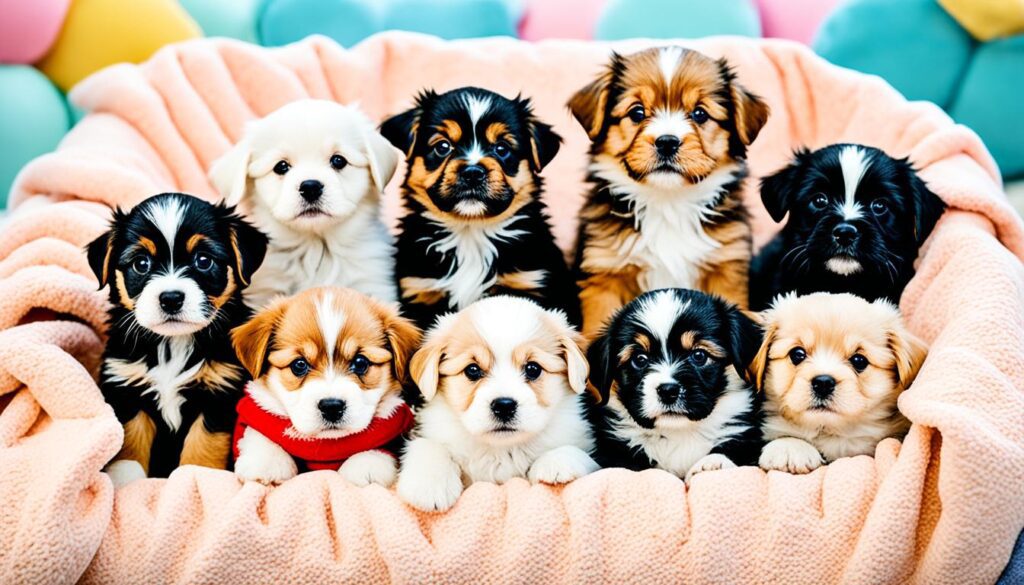
Bringing Your Quite Small Puppy Home (8-12 Weeks)
When you bring your small puppy home between 8-12 weeks of age, it’s crucial to prioritize their socialization and ensure they have positive experiences. This will help them adjust to their new environment and develop into a well-rounded and confident adult dog. Here are some essential tips for bringing your small puppy home:
- Introduce your puppy to other pets: Allow your small puppy to interact with other pets in a controlled and supervised manner. This will help them learn how to behave around other animals and promote their social skills.
- Familiarize them with new people, sights, and sounds: Take your small puppy for walks in different environments, exposing them to various stimuli such as different people, noises, and surroundings. Carrying them around outside can help them become familiar with the outside world and build their confidence.
- Gradually expose them to different experiences: Introduce your small puppy to different experiences such as car rides, grooming, and being handled. Start with short and positive sessions to help them associate these activities with positive associations.
- Begin leaving them alone for short periods: Gradually increase the time your small puppy spends alone to prevent separation-related behavior. Start with short durations and gradually build up their independence.
- Establish a consistent routine and rules: Set a daily routine for your small puppy, including feeding times, potty breaks, playtime, and training sessions. Consistency will help them feel secure and learn what is expected of them.
- Continue their puppy toilet training: Reinforce your small puppy’s toilet training by taking them outside regularly and rewarding them for eliminating in the appropriate spot. Consistency and positive reinforcement are key to successful toilet training.
- Feed them the same puppy food: Stick to the same puppy food that your small puppy was eating before coming home. Gradually transition to a different food if necessary, to avoid digestive issues.
- Maintain small, regular meals: Small puppies have small stomachs, so it’s important to feed them frequent meals throughout the day. Follow the recommended feeding guidelines for your puppy’s age and breed.
By following these tips and providing a safe, structured, and positive environment, you can help your small puppy adjust to their new home and set them up for a lifetime of happiness and well-being.
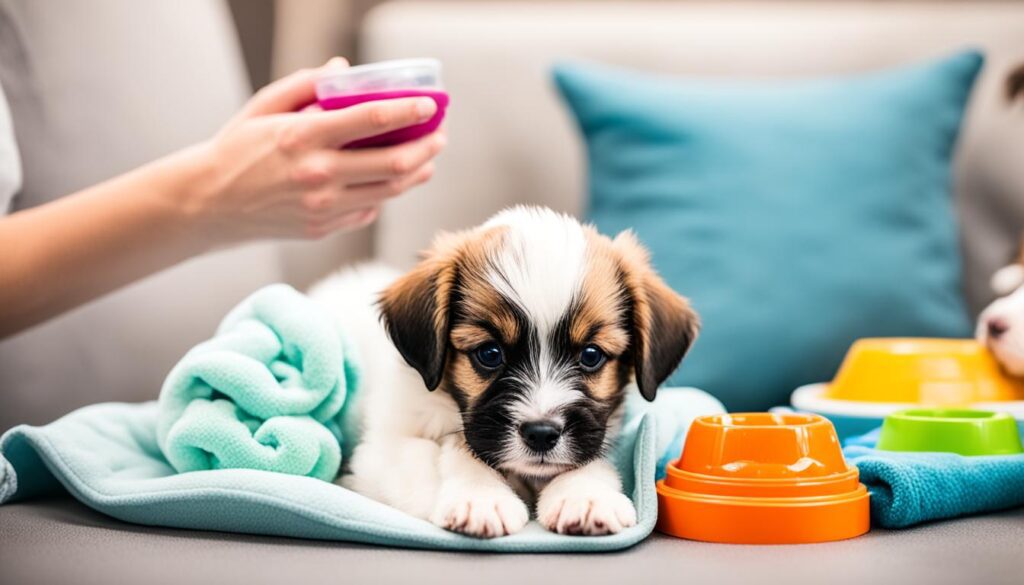
Training and Socializing Your Quite Small Puppy (12 Weeks Onwards)
Once your small puppy reaches around 12 weeks of age and has received their second vaccinations, it’s time to focus on training and socialization. These activities are crucial for your puppy’s development and well-being.
Consult with your vet about worming, flea treatment, and neutering. Regular preventive measures will help keep your puppy healthy and protected from common parasites and diseases.
Socialization is an important aspect of your puppy’s training. Introduce them to other fully vaccinated dogs in a safe and controlled environment, such as a dog park or a friend’s backyard. This exposure will help them learn appropriate behaviors and improve their social skills.
Enrolling your puppy in puppy classes can be highly beneficial. These classes provide structured training sessions and opportunities for your puppy to interact with other dogs. They will learn basic commands, proper leash etiquette, and gain confidence. Look for reputable trainers or training facilities in your area.
It’s essential to understand and respect your puppy’s preferences during training sessions. Use their favorite treats or toys as positive reinforcement to motivate them. This will make learning more enjoyable for both of you.
Remember that puppies have shorter attention spans and energy levels. Keep training sessions short, frequent, and fun to maintain their focus and prevent them from getting overwhelmed or tired.
As your puppy grows, consider furthering their training by attending dog training classes. These advanced classes will build upon the foundation you’ve established, teaching more complex commands and behaviors.
Additionally, as your puppy matures, their dietary needs will change. Consult your vet about transitioning to adult dog food and feeding schedules.
Always keep an open line of communication with your vet. If you have any concerns or questions about your puppy’s training, socialization, or health, seek their professional advice.
The Benefits of Training and Socializing Your Small Puppy
Training and socializing your small puppy from an early stage have numerous benefits:
- Builds their confidence and reduces anxiety
- Improves their social skills and interactions with other dogs and people
- Enables better control and obedience
- Makes them more adaptable to new environments and experiences
- Prevents behavior issues and aggression
- Strengthens the bond between you and your puppy
Remember, patience, consistency, and positive reinforcement are key to successful training and socialization. With proper guidance and care, your small puppy will grow into a confident and well-behaved adult dog.
Conclusion
Caring for a quite small puppy requires careful preparation, socialization, and training. By following these tips and advice, you can ensure your small puppy receives the best care and sets a solid foundation for a happy and healthy life. Remember to consider the specific needs of your chosen small puppy breed and consult with a veterinarian for personalized guidance. With proper care and attention, your quite small puppy will grow into a beloved member of your family.
FAQ
What preparations should I make before bringing home a small puppy?
Before bringing your small puppy home, create a space for them to play and provide toys for entertainment. Set up a comfortable resting area and remove any potential hazards from your home. Find a local vet for your puppy’s healthcare needs and consider enrolling them in puppy classes. Lastly, obtain pet insurance for their future well-being.
At what age should I bring my small puppy home?
It is recommended to bring your small puppy home between 8-12 weeks of age.
How should I socialize my small puppy after bringing them home?
Introduce your puppy to other pets, fully vaccinated dogs, cats, and expose them to new people, sights, and sounds. Gradually familiarize them with different experiences such as car rides, grooming, and being handled. Begin leaving them alone for short periods to prevent separation-related issues. Establish a consistent routine and rules and continue their puppy toilet training.
When can I start training my small puppy?
Once your small puppy reaches around 12 weeks of age and has received their second vaccinations, you can start focusing on training and socialization.
Should I consider neutering my small puppy?
It is advisable to consult with your vet about neutering options for your small puppy. They can provide guidance based on your puppy’s breed and individual needs.
How often and for how long should I train my small puppy?
Keep training sessions short and fun, catering to your puppy’s attention span. Allow them to rest regularly to avoid fatigue.
What should I feed my small puppy?
Feed your small puppy the same puppy food they were accustomed to before coming home. As they grow, consult with your vet and transition them to an appropriate adult dog food.
When should I consult with a veterinarian for my small puppy?
It is important to consult with a vet for your small puppy’s healthcare needs, including vaccinations, worming, flea treatment, and general wellness check-ups. They can also address any concerns you may have about your puppy’s behavior or health.
What are some general care tips for my small puppy?
Provide a safe and comfortable environment, regular exercise, proper nutrition, grooming, and socialization opportunities. Maintain a consistent routine and offer mental stimulation through interactive play and training sessions.
What else should I consider when caring for my small puppy?
Apart from the care guidelines mentioned, it is important to consider the specific needs of your chosen small puppy breed. Every breed may have unique characteristics and requirements. Consulting with a veterinarian can provide personalized guidance based on your puppy’s specific needs.

